Search Results
Showing results 81 to 100 of 100

Make a Garbage Bag Kite
Source Institutions
Make a kite out of a garbage bag, shower curtain, painting tarp--anything light, thin, flexible and plastic!

Toy Chemistry
Source Institutions
In this playful, goopy activity, learners mix two liquids to create a solid (that sometimes acts like a liquid ), using basic household materials such as borax and glue.
Ride on a Slide: Toys or Tubes Ride Slopes and Angles
Source Institutions
This activity is a hit for family events and all ages—some will finish in 45 minutes; others can go on for hours.

Genetics the Easy Way
Source Institutions
In this activity, learners make critters out of recyclables and apply the rules of mathematics to solve genetics problems.
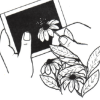
Flower Powder
Source Institutions
In this outdoor activity, learners use artificial bees and paper models of flowers to find out how bees transfer pollen from one flower to another.
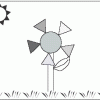
Bloomin' Bud Glyph
Source Institutions
In this math lesson, learners practice reading charts and graphs by creating and interpreting glyphs.
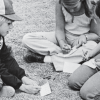
Attention!
Source Institutions
In this outdoor art/environmental activity, learners create designs that will attract attention to animals and plants in particular habitats, and then test whether their designs attracted the "right"
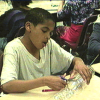
Pop Bottle Whirligig
Source Institutions
Learn about friction and kinetic energy with this cool spinning toy.

Crazy About Kites
Source Institutions
In this activity, learners build a kite out of paper, change it, and try to make it fly even better. With their new knowledge of kite making, students can then go on to create their own kite designs.
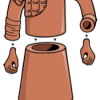
Building an Army
Source Institutions
In this activity, learners explore the potential of interchangeable standard parts to create a large number of unique creations in different combinations.
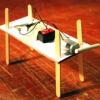
Minibot
Source Institutions
In this activity, learners build a mini dancing robot. This engineering activity introduces learners to electricity, circuits, switches, conductivity, and motors.
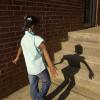
Exploring Shadows
Source Institutions
This activity guide features three related explorations to help learners ages 3-6 investigate shadows via the following science concepts: A shadow is made when an object blocks the light; you can chan
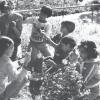
Invent an Animal
Source Institutions
In this outdoor activity and game, learners explore how animals adapt for survival through coloration, markings and camouflage.

The Carbon Cycle and its Role in Climate Change: Activity 3
Source Institutions
In this activity, learners explore the human influences on the carbon cycle and examine how fossil fuels release carbon.
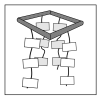
Food Chains and Webs
Source Institutions
In this activity, learners investigate feeding relationships. Learners complete a food web and then make a mobile to represent a food chain.
Giant Museum: Create a Scale Model
Source Institutions
In this activity, learners will predict the size of a giant scale model of a comb or other rectangular object, then make one. If you tripled the size of a dollar bill, could you sit on it?
Disappearing Water
Source Institutions
In this outdoor water activity, learners explore evaporation by painting with water and tracing puddles. Learners will discover that wet things become dry as the water evaporates.
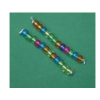
Protein Bracelets
Source Institutions
In this activity, learners use beads, which represent amino acids, to create protein bracelets. Learners examine the relationship between amino acids and proteins.
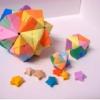
Paperfolding Polyhedrons
Source Institutions
In this activity (on pages 55-66 of PDF), learners fold paper into origami shapes and then combine several identical shapes into a three-dimensional structure.
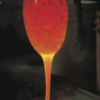
Hot Stuff!
Source Institutions
In this activity, learners discover that sand is the major ingredient in glass.
